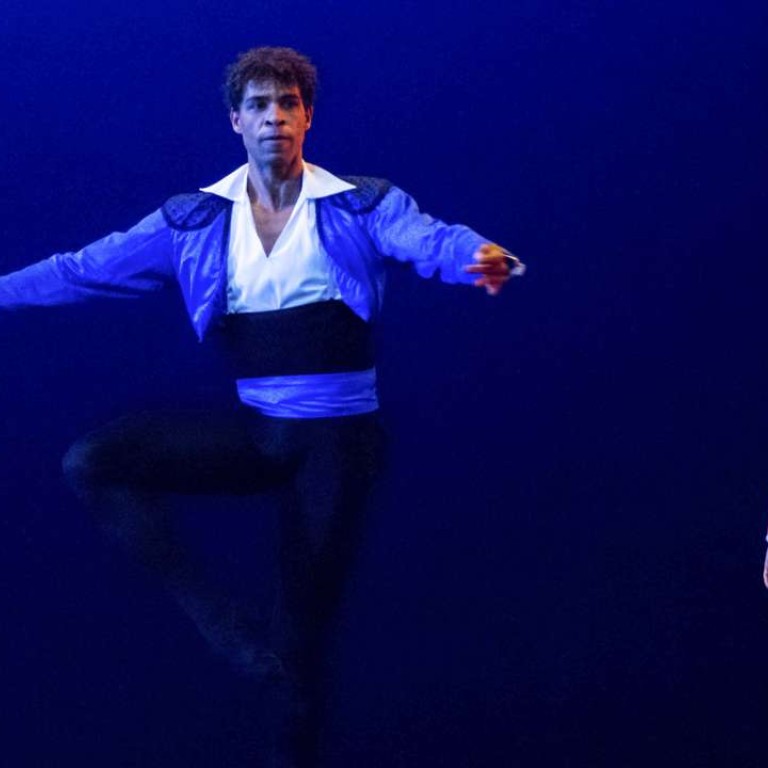
Review: Carlos Acosta’s farewell tour – young dancers to the fore as legend takes final bow
The Cuban ballet star should be commended for promoting young talent from the island, but some lack the experience to do classical ballet justice – not that that bothered an adoring audience
The combination of spectacular dancing, powerful masculinity and Cinderella life story have won Carlos Acosta a legion of fans, and made him perhaps the first male ballet dancer since Mikhail Baryshnikov to become famous beyond the dance world.
Born into poverty and the youngest of 11 children in Havana, Acosta was running wild in the streets as early as age 10. Acceptance into Cuba’s National Ballet School threw him an unexpected lifeline and by 20 he was an international star. His autobiographical show Tocororo – A Cuban Tale, seen in Hong Kong in 2005, was a worldwide hit and his success has helped open doors for black dancers in ballet. A member of the Royal Ballet since 1998, among his many awards is a “Commander of the Most Excellent Order of the British Empire” to honour his contribution to ballet in Britain.
Now, at 43, he’s decided the time has come to stop forcing his body through the pain of dancing classical roles and focus on other aspects of dance, notably starting a school and a company in his native Cuba.
A Classical Farewell is both his last hurrah as a classical dancer and a look ahead to what he plans to do in the future. Sadly, the programme itself is disappointing.

This time Acosta has brought together 10 dancers from Cuba, most of them young and inexperienced – and that’s the problem.
While the aim of encouraging new talent is commendable, these performers simply aren’t equipped to deliver the virtuosity and star power this kind of gala programme needs.
The high points of the first half were Bournonville’s La Sylphide, which featured some lovely jumps and beats from Javier Rojas, and a dazzling final solo from Deborah Sánchez and a confident display of technique from Laura Rodríguez in Diana and Actaeon.
The pas de deux from Kenneth MacMillan’s Winter Dreams was handicapped by being shorn of its dramatic context and Ely Regina Hernández lacked the fluidity for the ballerina role, although her partner Luis Valle showed he has good potential.
The white swan adagio from Swan Lake was under-rehearsed and under-performed – as if one swan wasn’t enough, the same dancer, Gabriela Lugo, was equally inept in The Dying Swan. Giving young artists opportunities is one thing: casting them in roles beyond their capacity is another.
The second half choreography was a mixed bag that ranged from slick (A Buenos Aires, a tango number by Gustavo Mollajolli) to slack (Anadromous, a dreary solo by Raul Reinoso).
The best was saved till last with Majismo, by Cuban choreographer José Garcia, which made a rousing finale. A pseudo-Spanish classical divertissement in the Don Quixote mould, it was performed with assurance by its cast of eight and predictably brought the house down.
Acosta appeared in three pieces, including Majismo, where the solos suited him well – the speed and power of his manège of flying jumps around the stage were thrilling and his turns splendid. He demonstrated delightful comic flair in Ben Van Cauwenbergh’s interpretation of Jacques Brel’s witty, mordant Les Bourgeois (although non-French speakers may have wondered what it was all about).

It’s a thankless task to criticise a legend. Acosta’s achievements, professional and personal, are admirable and one can only hope that his future projects are better than this one might suggest.
In any case, none of the programme’s weaknesses bothered the audience one bit. They were there to see Acosta and the ovations at the end of the show made it clear they were going home happy.
Carlos Acosta – A Classical Farewell, Hong Kong Cultural Centre Grand Theatre. Reviewed: June 30

